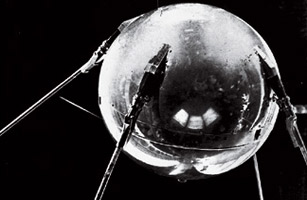
The Soviets launch the satellite Sputnik.
Oct. 4, 1957
Some 50 scientists from 13 countries, all members of the International Geophysical Year's conference on rockets and satellites, had gathered, along with a handful of journalists, for cocktails that night at the Soviet embassy on Washington's Sixteenth Street. New York Times science reporter Walter Sullivan was called to the phone and told that Moscow had announced that it had put a satellite into orbit. He hurried back and whispered the news in the ear of U.S. physicist Lloyd Berkner, who rapped on the hors d'oeuvre table until the hubbub quieted and dramatically declared to the unknowing and startled group, including the Russians, "A satellite is in orbit at an elevation of 900 km. I wish to congratulate our Soviet colleagues on their achievement."
Washington changed in those next few hours. The U.S., which had assumed scientific pre-eminence, had been beaten in the opening lap of the space race. Before the night was over the Russians had fueled themselves with vodka and stood curbside in front of their embassy, staring into the night sky, singing and cheering.
I didn't go to bed that night, rushing from the Soviet embassy to Capitol Hill to the White House. Those at the center of the power game knew their lives had changed. At the Naval Research Laboratory, which was in charge of America's entry in the space race, Project Vanguard, the engineers bathed the roof in searchlights so they could adjust their radio dishes to pick up the defiant beep from Sputnik, the 184-lb. intruder that had not only humiliated the U.S. but ratcheted up the cold war. The Soviet rockets obviously were bigger and better than we knew.
The White House feigned indifference, and reassured the nation about American scientific prowess. Some of the U.S.'s top scientists, like M.I.T.'s Vannevar Bush, took refuge behind closed doors until they could figure out what to say. Worry seeped through the nation, always uncomfortable with second place. When the U.S. hurried its thin, finely engineered rocket, with a satellite, to the launching pad two months later, Vanguard lurched, buckled and blew up on the ground. The gentle astronomer John Hagen, who headed Project Vanguard, sucked on his ever present pipe and rightly pointed out that U.S. space science was more sophisticated than that of the Soviets. But by then the game had moved beyond pure science.
Two young and driven politicians took notice. Senate majority leader Lyndon Johnson seized the moment of doubt and pushed the U.S. space program forward in Congress. Senator John Kennedy saw space as the next great national adventure, and when he became President four years later, he decided to land Americans on the moon.